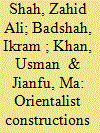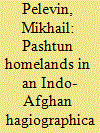| Srl | Item |
| 1 |
ID:
187166


|
|
|
|
|
| Summary/Abstract |
This article seeks to explore the colonial encounters with Pashtuns of the erstwhile North West Frontier Province (now renamed as Khyber Pakhtunkhwa), Pakistan and their mythical Orientalist constructions in the colonial historical and ethnographic accounts of the late 18th, 19th, and 20th centuries. The recurring colonial images and the transformation of colonial discourses and post-colonial effects on Pashtun identity and society are analyzed in this research article. Noticeably, it looks into the paradigm shift from the anthropocentric views of Pashtuns to Orientalized and Europocentric ideas by applying Edward Said’s influential thesis of ‘Orientalism’ and integrating the work of other post-colonial thinkers. This research article draws upon archival, anthropological, ethnographic field data to supplement the textual analysis and challenge the Orientalist and colonial representation of Pashtuns. The ethnographic field data were gathered through in-depth interviews with various Pashtun intellectuals, poets, writers, and authors from various institutions in Peshawar and Charsadda. However, this research article demonstrates that there are colonial biases and Eurocentric constructions of Pashtuns in the colonial accounts and texts. The colonial biassed representations of Pashtuns are transformed into postcolonial discourses. Pashtuns and Pashtun society are still uncritically analyzed through colonial lenses and spectacles.
|
|
|
|
|
|
|
|
|
|
|
|
|
|
|
|
| 2 |
ID:
193602


|
|
|
|
|
| Summary/Abstract |
The article explores the ethnocultural aspects and ideological implications of a hagiographical collection from the Tārīkh-i Khānjahānī wa Makhzan-i Afghānī (1613), a book on the general history of the Pashtuns compiled in the Indo-Afghan diaspora. This article primarily focuses on the stories that either presumably originate from or directly relate in content to Pashtun tribal areas to the west of the Indus. Being foremost a supplement to the Tārīkh-i Khānjahānī’s genealogical section, the hagiographical anthology was included in this book to highlight and illustrate the idea of the Pashtuns’ continuous adherence to Islam throughout many centuries. However, its narratives suggest that Islamic traditions in the Pashtuns’ collective memory can be traced back as far as the turn of the thirteenth century. While the genealogies maintained the principle of patrilineal descent as the basic attribute of Pashtun identity, the hagiographies affirmed the profession of Islamic faith as another integral component of this identity and also brought to light its linguistic criterion. One of the article’s sections offers a survey of the cases where the Pashto language as well as Pashto lexemes and phrases are mentioned in the Persian text of the hagiographies. The article also attempts to locate the Tārīkh-i Khānjahānī’s hagiographical collection among similar works in Indo-Persian literature; it also considers such still-understudied issues as the emergence of spiritual lineages in Pashtun tribes and the entwining of folklore and conventional Islamic elements in the stories about Pashtun religious leaders.
|
|
|
|
|
|
|
|
|
|
|
|
|
|
|
|